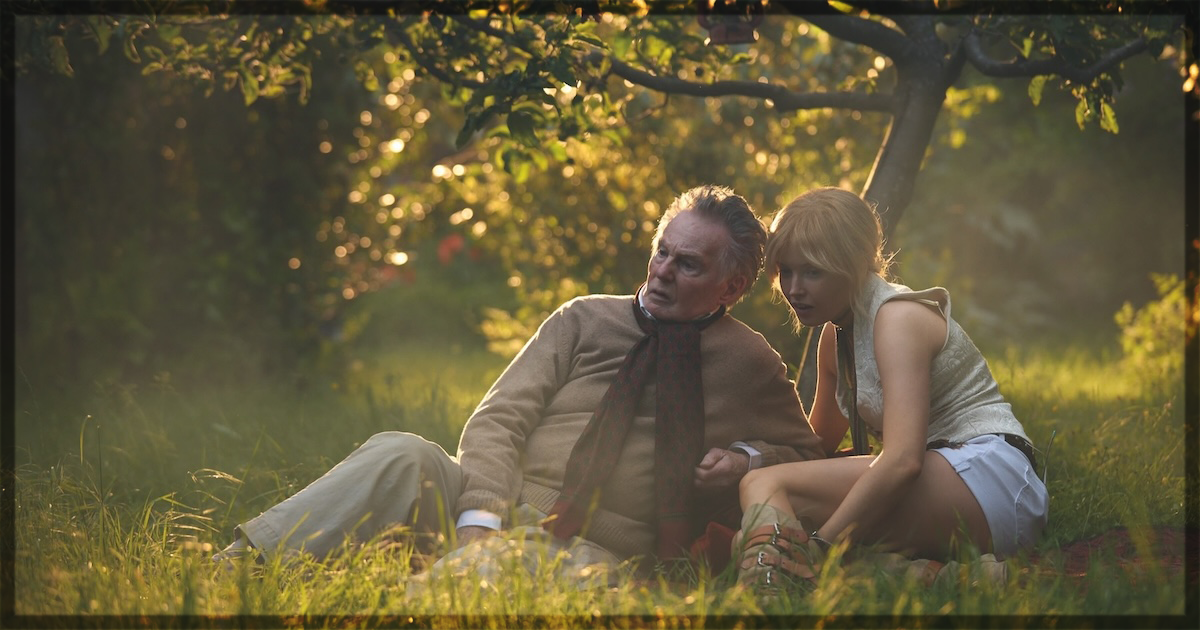Of course the London Film Festival is the right place for the world premiere of Moss & Freud, a movie about two British people who understood more than most the power of an image. But since Kate Moss is one of its executive producers, Moss & Freud is unwilling to delve beneath the surface in any way. Cinematographer Maria Ines Manchego’s superbly smeary work is worth a look, but you might have a more interesting time picking up a magazine instead.
The assumption is we already know who they both are. It’s 2001 or so and Kate Moss (Ellie Bamber) is a supermodel at the height of her career, with a heedless global image as a party girl. Lucian Freud (Derek Jacobi) is a painter of national renown with a surname of global repute, but as a person he’s a man of rigid routine and selfish appetites, more on which later. They are introduced by Kate’s friend and Lucian’s daughter Bella (Jasmine Blackborow) via a private chat in a major London museum in the hopes that Kate will agree to pose for a portrait. The posing requires arriving at Lucian’s studio – the top floor of a large house in one of London’s fanciest neighbourhoods, where the champagne never runs out – at 7 pm sharp at least three nights a week for maybe a year. This does not align well with the schedule of a woman who works around the world and who famously complained about not getting to have fun all the time. And yet the painting exists, so this is the story of how it was made.
Except it isn’t. Writer-director James Lucas, who won an Oscar for a short film in 2015, was clearly hired here as Ms. Moss’s image consultant. Without this access the movie obviously would not exist, but because of that access the opportunity to do something fresh and inspiring was wasted. The idea the movie repeatedly hammers is that their time together enabled them both to grow. This is extremely debatable, not least because the dialogue is largely whining small talk or exposition of the kind that gets a script laughed out the door. For just the one example, the interview in which Kate meets journalist Jefferson Hack (Will Tudor) opens with him asking her favourite colour.
This is a huge disservice to two people who knew everything possible about how an image is constructed. Kate’s ability to reach into a camera and make you feel her presence is taken for granted. Instead there are multiple little moments of her helping herself to other people’s drinks out of their hands before swallowing and whirling away. The extended sequence in a Berlin nightclub, where Kate finds herself next to a man touching himself while wearing a t-shirt with her face on it, implied a more vicious critique of the downsides of being an image than actually happens. Ms. Bamber, who spends a huge amount of time naked, otherwise flounces around in an extraordinary array of beautiful clothes with almost nothing to do. Ms. Moss has famously kept her mouth shut to the press and it’s a surprise that the opportunity to showcase a more thoughtful or intelligent side to her was passed up.
Meanwhile, instead of Lucian treating Kate as an equal, he is exclusively focused on his own wants. His brief interactions with Bella are uncomfortably disinterested, he throws screaming tantrums when Kate is seven minutes late, and it’s clear he is more interested in Kate’s body than the person inside it. The contrast between Mr. Jacobi’s frail physicality and the unpleasant fury roaring out of it should have had more of a kick. This is not Mr. Jacobi’s fault, who does as much as anyone could do with the part, but there’s an emptiness here that the movie refuses to touch. (It’s important to add that Bella briefly mentioning that Lucian has a thing for getting women pregnant was quite the understatement: Mr. Freud had at least fourteen children, and other than the children from one of his marriages, he officially acknowledged none of them until they were at least 18 years old. What a stand-up guy, eh?)
This could have been a fascinating battle between the woman with the body everyone coveted trying to change her image and a painter keen to cut her glamour down to size for his own purposes. There could have been chat about how the human image endures through time, the problems between male artists working with female bodies, or why the ephemeral business of fashion is not taken as seriously as mediocre portraiture. But no. Instead Moss & Freud is like a lot of modelling work: absolutely beautiful images selling an idea of beauty you are just never going to buy. It’s a terrible misfire.
Moss & Freud recently played at the London Film Festival.
Learn more about the film at the LFF site for the title.


